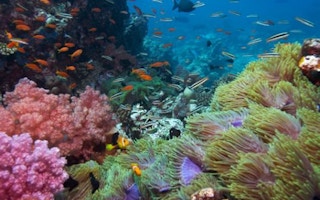Marking the International Day for Biological Diversity, UN Secretary-General Ban Ki-moon Tuesday highlighted the fragile state of the world’s oceans, urging greater protection for marine biodiversity.
“Oceans cover almost three-quarters of the surface of the globe. They are home to the largest animal known to have lived on the planet — the blue whale,” said the UN chief on the International World Biodiversity Day.
“From sandy shores to the darkest depths of the sea, oceans and coasts support the rich tapestry of life on which human communities rely on,” Ban added.
On May 22, the UN General Assembly marked International Day for Biological Diversity, to increase awareness of issues affecting global marine life. With its theme on marine diversity this year, the UN chief emphasized on the impact of commercial exploitation of fish stock.
In his message, Ban said, more than half of world’s fisheries have exhausted their stock, with an additional third of the world’ s fisheries in complete depletion. Moreover, an estimated 30 to 34 percent of marine environment consisting of coral reefs, mangroves, and sea grasses have been destroyed.
“Increased burning of fossil fuels is affecting the global climate, making the sea surface warmer, causing sea level to rise and increasing ocean acidity, with consequences we are only beginning to comprehend,” said the UN chief.
While concerns over marine life for the future were raised, the UN chief remains positive on the overall outlook for the future. ” There is hope,” he said, noting that despite the damages done to the marine wildlife and habitats, an estimated 50 percent have shown recovery once the threat imposed by human presence was decreased.
“Lately, some progress is being made, particularly with the establishment of large-scale marine reserves and documenting areas of ecological or biological significance in open-ocean and deep- sea habitats,” Ban said.
Ban said the upcoming UN Conference on Sustainable Development (Rio+20), in Rio de Janerio, Brazil, next month, will provide an opportunity to recommit to building on advances made so far.
“Rio+20 must galvanize action to improve the management and conservation of oceans through initiatives by the United Nations, governments and other partners to curb over fishing, expand marine protected areas and reduce ocean pollution and the impact of climate change,” Ban said.
“By taking action at the national, regional and global levels, including enhancing international cooperation, we can achieve the Aichi Biodiversity Target of conserving 10 per cent of marine and coastal areas by 2020, a crucial step in protecting marine biodiversity for the future we want.”










